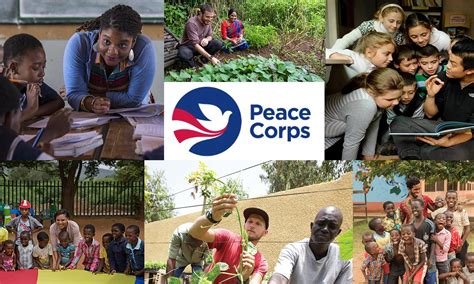Serving the World While Making a Difference
The Peace Corps, a prominent organization established by President John F. Kennedy, has been at the forefront of fostering global understanding and progress for over six decades. Its mission is to promote world peace and friendship through the efforts of dedicated volunteers who live and work in developing countries for a period of two years. By immersing themselves in local communities, these volunteers gain firsthand knowledge of the challenges and aspirations of people from diverse cultures. Their work spans a wide range of sectors, including education, health, agriculture, and the environment.

The Impact of Peace Corps Volunteers
Over the past 60 years, more than 240,000 Peace Corps volunteers have served in over 140 countries. Their contributions have had a profound impact on both the communities they serve and on their own personal and professional development. For instance:
- Education: Volunteers have taught in over 800 schools and universities, improving access to quality education for countless students.
- Health: They have worked alongside local healthcare providers to combat diseases, improve nutrition, and promote hygiene practices, reducing mortality rates and improving overall well-being.
- Agriculture: Volunteers have introduced innovative farming techniques, improved crop yields, and empowered local farmers to increase their incomes and feed their communities.
- Environment: They have led environmental conservation efforts, protected endangered species, and raised awareness about the importance of environmental conservation.
Benefits of Serving in the Peace Corps
Participating in the Peace Corps offers a transformative experience that empowers volunteers to make a meaningful difference in the world while gaining invaluable skills and personal growth. Some of the key benefits include:
- Expanding Global Perspective: Living and working in a foreign country broadens one’s understanding of diverse cultures, customs, and perspectives.
- Developing Intercultural Competency: Volunteers learn to navigate cultural differences, build cross-cultural relationships, and work effectively in multicultural environments.
- Acquiring Practical Skills: They gain hands-on experience in various fields, developing valuable transferable skills in project management, communication, problem-solving, and teamwork.
- Enhancing Leadership Abilities: By working closely with local communities and leading projects, volunteers hone their leadership skills and learn from the experiences of others.
- Fostering Self-Reliance: Living in new environments with limited resources promotes self-reliance, adaptability, and resilience.
How to Join the Peace Corps
To become a Peace Corps volunteer, one must meet certain eligibility requirements, including being a U.S. citizen, being at least 18 years of age, and being in good physical and mental health. The application process is comprehensive and involves submitting an online application, completing an interview, and undergoing a medical screening.
The Peace Corps offers three main service tracks:
- Traditional Service: A two-year commitment where volunteers live and work in a host country.
- Response Service: Short-term assignments of three to six months to address specific community needs.
- Fellowships: Specialized programs that combine service with professional development opportunities.
The Legacy of the Peace Corps
The Peace Corps has made significant contributions to global development and has played a vital role in promoting peace and understanding. As a pioneer in the field of international volunteerism, it has inspired countless other organizations to follow in its footsteps. Its legacy will continue to shape the lives of volunteers and the communities they serve for generations to come.
Tables
| Sector | Number of Volunteers | Impact Highlights |
|---|---|---|
| Education | Over 100,000 | Improved literacy rates, increased access to quality education, teacher training |
| Health | Over 40,000 | Reduced mortality rates, improved nutrition, enhanced healthcare access |
| Agriculture | Over 25,000 | Increased crop yields, empowered local farmers, promoted sustainable farming practices |
| Environment | Over 15,000 | Protected endangered species, conserved natural resources, reduced environmental degradation |
FAQs
1. What is the average age of a Peace Corps volunteer?
Answer: 28 years old
2. What is the minimum age to serve in the Peace Corps?
Answer: 18 years old
3. Are there age limits for serving in the Peace Corps?
Answer: No
4. How long is the typical Peace Corps service period?
Answer: Two years
5. What types of benefits do Peace Corps volunteers receive?
Answer: Health insurance, housing allowance, living stipend, travel expenses, and post-service benefits
6. Can I serve in the Peace Corps with my spouse or family?
Answer: Yes, but it is subject to certain conditions and approvals
7. What is the overall goal of the Peace Corps?
Answer: To promote world peace and friendship through the service of volunteers
8. How many countries has the Peace Corps served in?
Answer: Over 140 countries
